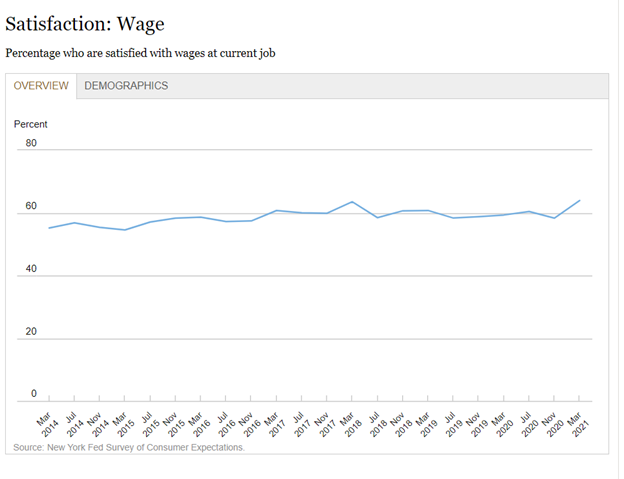Recent data from the Federal Reserve Bank of New York shows that employees are happier than ever by some measures.
Every four months, the Fed completes a survey about economic expectations. The survey includes questions on retirement plans and employment opportunities. This survey began in March 2014.
While there isn’t an extensive history, the survey does cover an economic expansion, a recession and a recovery. This is sufficient to uncover some interesting trends.
One surprising piece of data shows that 63.9% of respondents are satisfied with their wages, a record high.
Contrary to Headlines, Many Employees Are Satisfied With Wages

Source: New York Fed.
Employees Are Optimistic About Retirement
The number of respondents who are satisfied with promotion opportunities is also at a record high.
This data conflicts with anecdotes in the news.
When employees voted on whether to form a union at an Amazon warehouse in Alabama, organizers called it “the most important labor struggle in more than half a century.” When the union lost, major media outlets cited Amazon’s power, and policymakers are advocating for processes that make unions less likely to lose in the future.
Recently, Congress tried to raise the minimum wage and claimed it was necessary to restore equity to the workplace. Politicians argued employers were treating workers unfairly, and the only solution was a new law.
That makes the Fed survey data a surprise. Workers are more satisfied than ever. And many are so satisfied with their wages that they are planning to retire early.
In the most recent survey, 48.6% of respondents said they plan to retire at 62. This is the minimum age to access Social Security benefits. Monthly payments are significantly reduced compared to working until full retirement age, which is 67 for most people.
Retiring early indicates a degree of confidence in an individual’s long-term financial security. Concerns about security often lead people to work longer.
This survey indicates few workers feel exploited despite the headlines and cries from Washington. Overall, employees are optimistic, and that’s a bullish signal for the economy and the stock market.
I don’t like working more than I have to.
That’s why I found a way to beat the market by making one simple trade per week.
Last year, this trade helped me beat the market eight times over.
It’s a great way to accelerate your gains. Click here, and I’ll show you how it works.
Michael Carr is a Chartered Market Technician for Banyan Hill Publishing and the Editor of One Trade, Peak Velocity Trader and Precision Profits. He teaches technical analysis and quantitative technical analysis at the New York Institute of Finance. Mr. Carr is also the former editor of the CMT Association newsletter, Technically Speaking.
Follow him on Twitter @MichaelCarrGuru.





